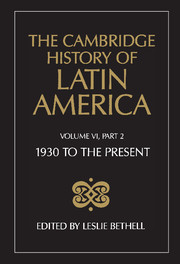4 - The military in Latin American politics since 1930
from Part Two - Politics
Published online by Cambridge University Press: 28 March 2008
Summary
The upheaval in the world economic and political order associated with the 1929 Depression inaugurated an intensely turbulent period in the politics of Latin America in which modern armies—that is to say, armies organized and equipped in imitation of the most prestigious European models and staffed by professional career officers—made their irreversible appearance on the political scene. Between February and December 1930, the military were involved in the overthrow of governments in no fewer than six, widely differing Latin American nations—Argentina, Brazil, the Dominican Republic, Bolivia, Peru and Guatemala. The same year also saw four unsuccessful attempts to seize power by force in other Latin American countries. Over the following two years, Ecuador and El Salvador in 1931, and Chile in 1932, joined the list of countries in which military-provoked political shifts and unscheduled changes of the executive had taken place.
The diversity of situations—indeed, the heterogeneity of Latin American societies and political systems—does not, however permit easy generalizations. A continent-wide approach must, in the logic of the comparative method itself, be corrected by appropriate attention to nuances, reservations and exceptions. Tendencies seemingly at work in most countries pass others by, and even where they are present may lead to different, even contradictory results. Thus Venezuela, under the iron hand of the ‘patriarch’ Juan Vicente Gómez, remained untouched by the political crisis which shook the continent, and seems to have entered the twentieth century only on the dictator’s death in 1935. In neighbouring Colombia, institutional stability also survived and was consolidated under Liberal hegemony, due in part to the so-called revolution en marcha (1934–8), a broad reformist programme within a framework of liberal democracy in which the military played no role.
- Type
- Chapter
- Information
- The Cambridge History of Latin America , pp. 233 - 304Publisher: Cambridge University PressPrint publication year: 1995
References
- 2
- Cited by

